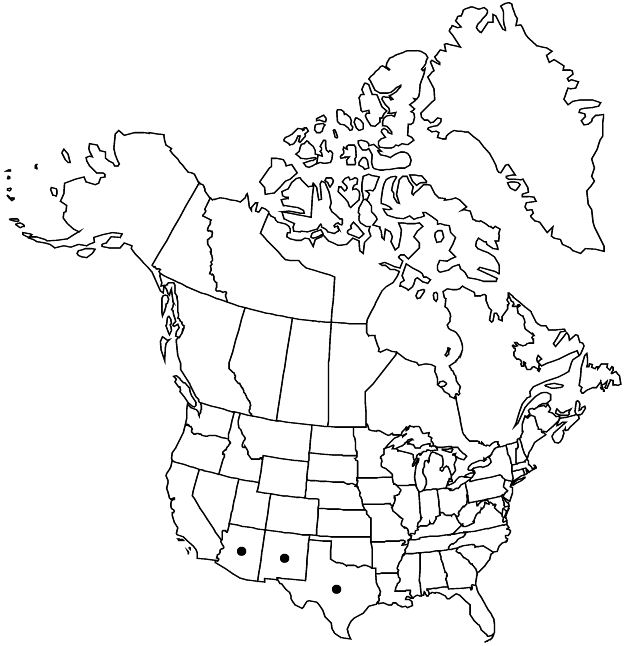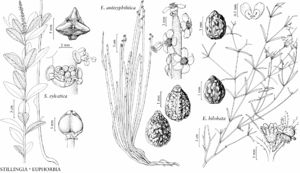Difference between revisions of "Euphorbia bilobata"
in W. H. Emory, Rep. U.S. Mex. Bound. 2(1): 190. 1859.
FNA>Volume Importer |
imported>Volume Importer |
||
| (6 intermediate revisions by 2 users not shown) | |||
| Line 1: | Line 1: | ||
{{Treatment/ID | {{Treatment/ID | ||
|accepted_name=Euphorbia bilobata | |accepted_name=Euphorbia bilobata | ||
| − | |accepted_authority=Engelmann | + | |accepted_authority=Engelmann |
|publications={{Treatment/Publication | |publications={{Treatment/Publication | ||
| − | |title=Rep. U.S. Mex. Bound. | + | |title=in W. H. Emory, Rep. U.S. Mex. Bound. |
|place=2(1): 190. 1859 | |place=2(1): 190. 1859 | ||
|year=1859 | |year=1859 | ||
| Line 13: | Line 13: | ||
}}{{Treatment/ID/Special_status | }}{{Treatment/ID/Special_status | ||
|code=F | |code=F | ||
| − | |label= | + | |label=Illustrated |
}} | }} | ||
|basionyms= | |basionyms= | ||
| Line 31: | Line 31: | ||
|elevation=1400–2600 m. | |elevation=1400–2600 m. | ||
|distribution=Ariz.;N.Mex.;Tex.;Mexico (Chihuahua;Durango;Sonora). | |distribution=Ariz.;N.Mex.;Tex.;Mexico (Chihuahua;Durango;Sonora). | ||
| − | |discussion=<p>In Texas, Euphorbia bilobata is known only from Jeff Davis County.</p> | + | |discussion=<p>In Texas, <i>Euphorbia bilobata</i> is known only from Jeff Davis County.</p> |
|tables= | |tables= | ||
|references= | |references= | ||
| Line 40: | Line 40: | ||
-->{{#Taxon: | -->{{#Taxon: | ||
name=Euphorbia bilobata | name=Euphorbia bilobata | ||
| − | + | |authority=Engelmann | |
| − | |authority=Engelmann | ||
|rank=species | |rank=species | ||
|parent rank=section | |parent rank=section | ||
| Line 52: | Line 51: | ||
|distribution=Ariz.;N.Mex.;Tex.;Mexico (Chihuahua;Durango;Sonora). | |distribution=Ariz.;N.Mex.;Tex.;Mexico (Chihuahua;Durango;Sonora). | ||
|reference=None | |reference=None | ||
| − | |publication title=Rep. U.S. Mex. Bound. | + | |publication title=in W. H. Emory, Rep. U.S. Mex. Bound. |
|publication year=1859 | |publication year=1859 | ||
| − | |special status=Weedy; | + | |special status=Weedy;Illustrated |
| − | |source xml=https:// | + | |source xml=https://bitbucket.org/aafc-mbb/fna-data-curation/src/2e0870ddd59836b60bcf96646a41e87ea5a5943a/coarse_grained_fna_xml/V12/V12_89.xml |
|genus=Euphorbia | |genus=Euphorbia | ||
|section=Euphorbia sect. Alectoroctonum | |section=Euphorbia sect. Alectoroctonum | ||
Latest revision as of 19:18, 5 November 2020
Herbs, annual, with slender taproot. Stems erect, branched, 10–35 cm, glabrous or strigillose (especially when young and around nodes). Leaves opposite proximally, alternate distally; stipules 0.1–0.2 mm; petiole 1–4(–6) mm, glabrous, sericeous or strigillose; blade linear to narrowly elliptic, 8–52 × 2–7 mm, base attenuate, margins entire, ciliate-strigose, apex acute, abaxial surface sparsely strigillose to sericeous, adaxial surface usually glabrous; venation obscure, only midvein conspicuous. Cyathia solitary at distal nodes or in weakly defined cymes or dichasia, dichasial bracts and distal stem leaves wholly green; peduncle 0.5–3.6 mm, strigillose. Involucre obconic, 0.9–1.5 × 0.9–1.3 mm, strigillose to pilose; glands 5, yellow or pink, U-shaped, 0.2–0.3 × 0.4–0.5 mm; appendages greenish, white, or pink, forming narrow rim around gland, or ovate, oblong, or obovate and usually 2-fid, rarely rudimentary, 0.2–1.4 × 0.2–0.6 mm, entire. Staminate flowers 20–25. Pistillate flowers: ovary glabrous, puberulent, strigillose, or pilose; styles 0.5–0.8 mm, 2-fid 1/3–1/2 length. Capsules oblate, 1.5–2.6 × 2.1–3.3 mm, glabrous or puberulent, strigillose, or pilose; columella 1.2–2.1 mm. Seeds brown to grayish black, narrowly ovoid, 3- or 4-angled in cross section, sometimes obscurely so, 1.3–1.9 × 1–1.4 mm, tuberculate, often with shallow depressions; caruncle absent. 2n = 32.
Phenology: Flowering and fruiting spring–fall.
Habitat: Sandy and rocky soils on slopes and canyon bottoms in pine-juniper woodlands, oak woodlands, grasslands.
Elevation: 1400–2600 m.
Distribution

Ariz., N.Mex., Tex., Mexico (Chihuahua, Durango, Sonora).
Discussion
In Texas, Euphorbia bilobata is known only from Jeff Davis County.
Selected References
None.
